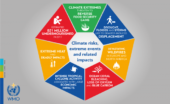Re Ian Bremmer 'Could third-party candidates upend the 2024 US election?' 3 April The current political movement in the USA…
Europe Cutting Biofuel Subsidies
Written by Diana Thebaud Nicholson // January 22, 2008 // Agriculture & Food, Biofuels, Europe & EU, Public Policy, Science & Technology, Sustainable Development // 1 Comment
January 22, 2008
Europe Cutting Biofuel Subsidies Redirects Aid to Stress Greenest Options
By ELISABETH ROSENTHAL
Governments in Europe and elsewhere have begun rolling back generous, across-the-board subsidies for biofuels, acknowledging that the environmental benefits of these fuels have often been overstated.
But as they aim to be more selective, these governments are discovering how difficult it can be to figure out whether a particular fuel — much less a particular batch of corn ethanol or rapeseed biodiesel — has been produced in an environmentally friendly manner. Biofuels vary greatly in their environmental impact.
Several countries — including Australia, Britain, France, Germany, the Netherlands, Switzerland, as well as parts of Canada — have removed or are revising incentives for farmers, biofuel refiners and distributors.
The manufacturers and sellers will have to quantify their fuel’s net effect on the environment before being eligible for subsidies, or even to count toward national biofuel quotas. Many European countries aim to have 5.75 percent of their transportation fuel made from renewable sources by the end of the year.
There is increasing evidence that the total emissions and environmental damage from producing many “clean” biofuels often outweigh their lower emissions when compared with fossil fuels. More governments are responding to these findings.
Under a proposed Swiss directive, for example, a liter of biofuel would have to produce 40 percent less in emissions than fossil fuel to qualify for special treatment.
Similarly, Germany recently canceled tax exemptions for biodiesel at the pump and is about to pass a mandate that only biofuels meeting sustainability criteria would count toward the national quota.
Last month, the Netherlands announced that it would no longer subsidize the importation of palm oil, its major source of green electricity generation, after investigators showed that the product was grown on Asian plantations created from drained peat land, with disastrous environmental consequences.
The biofuels craze was founded on the theory that plant-based fuels are carbon-neutral: The carbon dioxide released from burning biofuels would be canceled out by the carbon dioxide absorbed by plants as they grow. But this equation does not include emissions from processing the crops. Nor does it cover the environmental cost of fertilizers. Such factors vary significantly from biofuel to biofuel.
This week, the European Union will put forward an energy policy that, among other things, is expected to restrict imports of biofuels that are not produced in an environmentally sound manner. European governments have sought to encourage production with blanket incentives and mandates to plant crops and build refineries, as well as tax breaks for those who sell biodiesel and those who produce electricity.
Such policies have often led manufacturers to use the cheapest biofuels, rather than those that are best for the environment. The policies have also produced unintended consequences, like the sale by farmers of food crops for use as biofuel, leading to price increases for foods.
Last year, for example, Europe paid farmers a subsidy of 45 euros a hectare, or roughly $27 an acre, for any biofuel crop produced.
Under the Swiss policy, which the Federal Council is expected to approve this month, very few types of biofuel sources — like corn stalks — would qualify automatically for financial incentives. Food crops — sugar beets, rapeseed and soy — will fall into a second category, in which producers will have to prove that their biofuel is environmentally beneficial, on numerous levels.
The next step for many countries is to factor in the broader environmental and social effects of biofuel growing, particularly those imported from the developing world.
While Western subsidies and tax breaks were begun to benefit the environment and to help reduce the West’s dependence on foreign oil, they have been a boon for farmers around the world. Nascent biofuel industries in many countries, including in the West, are resisting cuts in such payments, without which they fear they cannot be profitable.
Tax breaks for corn ethanol and subsidies for building ethanol plants in the United States are motivated more by the desire to help farmers than to reduce greenhouse gas emissions, critics say. Corn is a relatively inefficient crop for making biofuel, because it requires intensive processing and in most cases yields only a minor emissions benefit.
Three years ago, Québec started building a subsidized corn ethanol plant, to move toward the provincial goal of supplying 5 percent of its fuel from biofuels by 2010. A few months ago, the province’s environment minister announced that it would build no more.
“We had to think about the environmental impacts of corn-based ethanol, the availability of feedstock and also greenhouse gas emissions,” said Daniel Bienvenue, the province’s deputy minister for Energy Strategy.
The government of Québec, like many others, is supporting research into making biofuel out of waste products like corn stalks and forest debris.
But the Québec plant has also demonstrated that, under the right circumstances, even corn ethanol can have some environmental advantage: it uses only local surplus corn. That means it is grown with low energy use and does not have to be transported long distances. The ethanol plant also uses electricity generated in a relatively clean manner.




One Comment on "Europe Cutting Biofuel Subsidies"
Biofuels a Lose-Lose Strategy, Critics Say
By Stephen Leahy
BROOKLIN, Canada, Jan 25 (IPS) – U.S. biofuels production is driving up food prices around the world, giving billions of poor people a very good reason to hate U.S. policy, say environmentalists.
“The U.S. has led the fight to stem global hunger, now we are creating hunger,” said Lester Brown, president of the Earth Policy Institute, an environmental think tank in Washington.
The booming U.S. ethanol industry is diverting enormous amounts food into fuel: 81 million tonnes of grain in 2007 and 114 million tonnes this year, equaling 28 percent of the entire U.S. grain harvest, Brown told IPS.
Previous eras of high grain prices were mainly the result of bad weather, but these price hikes are the result of government policy, he said.